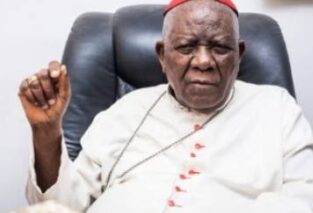(First appeared in Cameroon Tribune of Friday, February 6, 1987).
President Paul Biya’s call to the Cameroonian intellectual community to reflect and advise him on just what future we intend to bequeath to our children, was as unexpected and surprising as it was totally unprecedented. Never before in the history of this nation has a ruler ever so openly stretched out a hand of friendship and recognition to the intellectual community, or thought of inviting it to the table of ideas. Suspicion and at times outright hostility had become the hallmark of relations between our intellectual community and our rulers prior to Biya’s accession to power on November 6, 1982. You’ll no doubt recall the famous reminder to recalcitrant intellectuals: “Vous avez vos diplômes, nous, on a le travail – mangez vos diplomes, alors!” (you have your diplomas, we have the jobs. Go ahead and eat your diplomas!).
Sex and women
Fearful of losing perhaps much more than just his job, the Cameroonian intellectual eventually withdrew into a cocoon of silence and even cynicism, preferring anonymity, never ever wanting to be heard or quoted even on issues of pressing concern to the country. That campaign of intimidation was so successful that even today, in this reprisal–free atmosphere of the New Deal era, the only time you are likely to hear our intellectuals speak out loud and clear is when they find themselves in the comforting warmth of such exclusive preserves of theirs as chicken parlours and bar, where they rival each other in discussing football and, of course, the perennial and never-boring subject of sex and women – very “safe” territory indeed.
As a matter of fact, I have always wondered if our intellectuals ever look beyond the borders of this nation to other countries. Take the case of our next door neighbour, Nigeria. Not long after President Biya’s appeal for help from our intellectual community, the Nigerian Military Leaders, no doubt taking their cue from Yaoundé, also called on Nigerians to tell them how they would like to be governed in future. The enthusiastic response of Nigerians to their rulers’ call is perhaps indicative of a political maturity that still largely eludes us in this country today. Nigerian intellectuals took the leading role in the debate, supplying the ever eloquent and boisterous press with views that were eagerly consumed by a highly critical and well informed population.
Bravo! APEC
Compare that to what happened in this country. Except for the very commendable dynamism of the President of the Cameroon Association of Writers and Poets (APEC), Professor Kum’a Ndumbe, a writer in his own right, who did not hesitate to pick up the Head of State’s gauntlet and set a debate on that topic in motion among our writers, the rest of the intellectual community, as usual, preferred to remain uncommitted and out of sight.
But why is the Cameroonian intellectual so hesitant to stand up and be counted? I wonder. There’s no reason so far not to believe President Biya’s sincerity when he promises the Cameroonian people, as he did at the Bamenda Congress in 1985 that no son or daughter of this land will ever again be victimized for his or her ideas, or be forced to flee the land to be heard only in exile, or to channel his/her grievances through the barrel of a rifle hidden in the thick undergrowths of our forests, as was unfortunately the case many better-forgotten years ago.
Think-Tank Role
Despite the President’s assurances, the Cameroonian intellectual is still lamentably absent from the bludgeoning forum of ideas being nurtured by the New Deal Government. This absence has created a vacuum that is being increasingly filled by well-meaning but ill-prepared neophytes, whose half-baked views and shallow depths of perception are usually completely at odds with the weighty issues at stake. Take, for instance, what has become a yearly debate around the GCE Examination and the reasons for the poor results in that exam. The most thought-provoking, although usually poorly-phrased contributions more often than not come from the unfortunate candidates themselves, or from their teachers. You would search in vain for the learned views of our University professors of education or of the multitude of educational specialists in the numerous research centers mushrooming overnight in our Ministry of Higher Education. One wonders why our intellectuals so easily forfeit their role as the think-tanks of our society.
Take another glaring example: the University of Yaoundé. Were it not for the dogged persistence of our much maligned journalists of the written, spoken and audio-visual media, the alarming physical and moral degeneration of our sole university would have gone largely unnoticed. It is indeed rare for a member of the university staff to put his/her opinions about our ailing University in writing. (Is this perhaps the proverbial fear of biting the finger that feeds one?)
That is why Professor T. Menang’s recent article entitled “What ails our University?” (Cameroon Tribune, No 663, December 2, 1986 and No. 664 December 5, 1986, respectively, came as such a pleasant surprise. To my knowledge – I may be wrong here, I will bow to correction – his article is the first truly insightful analysis by a university staff member of the numerous apparently intractable problems besetting our university. The article in question is a careful and systematic analysis of a truly tragic situation and what the author sees as possible, realistic solutions to it. One can only hope that our university authorities and the Ministry of Higher Education will give those suggestions the serious attention they deserve. They constitute a therapy which, if applied without further ado, may still rescue our sick university from relegation to the rank of what the former vice-chancellor of Yaoundé University, Jean Imbert, said might one day become a “large-scale adult literacy center.”
I should, however, hasten to add here that unlike Jean Imbert I consider any comparison between the University of Yaoundé and an adult literacy center an insult to those who run adult literacy centers in this country. I don’t see any of such officials tolerating students who raid their classrooms and restaurants with impunity, making off with chairs, tables, plates and cutlery, or who deface and mutilate books in their library, or who mete out humiliating treatment with sadistic delight to female students in amphi-theaters, or who drop obscenities on the heads of our womenfolk in the streets of the capital city from passing buses.
If Professor Menang’s approach where to be adopted, and that’s what we are all praying for, discipline may once more make a timid appearance on the campus of our university. Let’s hope that other intellectuals will join him with more valid suggestions that could help make what now looks like a mere dream into a living reality. That may be the only way Cameroonian intellectuals are ever going to regain, in part or in whole, the initiative they have so far lost to the politician.


